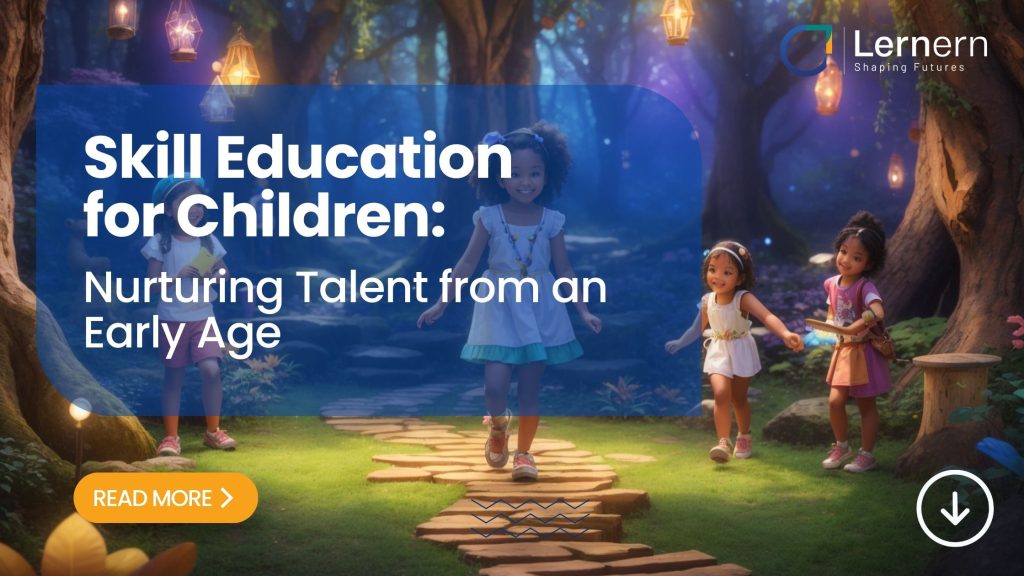Skill Education for Youth: Nurturing Talent from an Early Age

The basis of a child’s future lies in education, and in recent times, there has been an increasing acknowledgment of the significance of skill education in addition to conventional academic learning.
Skill education involves honing practical abilities that empower youth to excel in diverse fields, preparing them for success in both personal and professional spheres.
In India, there is a growing emphasis on skill education, underscoring the importance of fostering talent from an early age to ready youth for the forthcoming challenges of the future.
The Importance of Integrating Skill Education into the Indian Educational Framework
India is a diverse and vibrant country with a large youth population. While academic education is essential, it is not enough to address the diverse needs of the job market and society. Skill education complements traditional learning by empowering youth with hands-on experience and specialized knowledge in specific fields.
The Indian education system aims to bridge the gap between theoretical learning and practical application, fostering an entrepreneurial mindset among youth. Integrating skill-based learning into the curriculum prepares them for the evolving job market and promotes holistic development. This approach empowers youth to excel in diverse fields and contribute to India’s economic growth and societal progress.
Role of Skill Education
- Identifying and Nurturing Talent:
Every child is unique, possessing individual talents and interests. Skill education enables educators and parents to identify and nurture these talents from an early age. By providing opportunities for youth to explore various disciplines, such as sports, arts, technology, and vocational skills, we can uncover their passions and potential. This early identification lays the groundwork for focused skill development as they grow older.
- Holistic Development:
Skill education promotes holistic development by emphasizing not only cognitive abilities but also on emotional, social, and physical skills. One learns essential life skills like problem-solving, critical thinking, teamwork, and time management through practical learning experiences. These skills contribute to their overall growth and equip them to navigate challenges effectively.
- Promoting Entrepreneurship:
Encouraging skill education fosters an entrepreneurial mindset among youth. It empowers them to think creatively, identify opportunities, and develop solutions to real-world problems. By instilling an entrepreneurial spirit from a young age, India can nurture a generation of innovators and job creators, contributing significantly to the nation’s economic growth.
- Integration into the School Curriculum:
To ensure the effectiveness of skill education, it is essential to integrate it into the school curriculum. Balancing academic subjects with skill-based learning can be achieved through extracurricular activities, workshops, and specialized classes. This integration allows youth to excel academically while also honing their unique talents and interests.
- Empowering the Marginalised:
Skill education can play a transformative role in empowering marginalized youth in India. It can open doors to livelihood opportunities and break the cycle of poverty. By providing access to vocational training and skill development programs, we can equip underprivileged youth with the tools they need to lead better lives and contribute positively to society.
- Adapting to Changing Job Market:
The job market is constantly evolving, with technological advancements and changing industry demands. Skill education equips the youth with adaptable and future-ready skills that prepare them for the demands of the job market. As industries transform, individuals with diverse skill sets will be better equipped to secure employment and thrive in their careers.
- Parental Involvement and Support:
Parents play a pivotal role in nurturing their child’s talents and interests. They should actively participate in the skill education journey, understanding their child’s strengths and encouraging them to pursue their passions. Supportive parents create an environment where youth feel confident in exploring their talents and interests.
Conclusion
Skill education is vital for fostering talent in a child’s early development. Integrating it with traditional academics is crucial for India’s progress, recognizing and nurturing each child’s distinctive abilities. This approach molds well-rounded individuals, equipping them with academic knowledge and practical skills for future challenges. It goes beyond conventional teaching, fostering a comprehensive skill set.
Investing in skill education empowers youth and contributes to a brighter, prosperous India. It creates a workforce academically adept and possessing practical skills to meaningfully contribute to society. This proactive approach paves the way for a future where youth is well-prepared, versatile, and capable of steering India toward sustained growth.
Leave a Reply